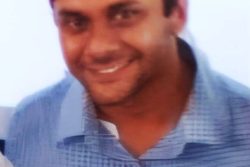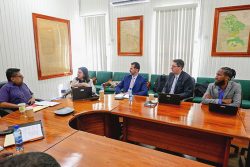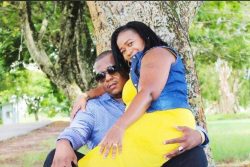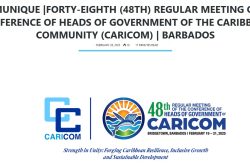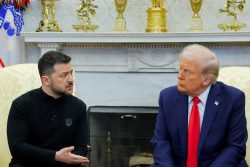Despite the concerns of the opposition at a lack of consultations on what was described as a “cut and paste” Coroners (amendment) Bill which fueled a more than two-hour-long debate, government last evening passed the piece of legislation.
Attorney General Basil William, the mover of the bill, argued that the amendments would pave the way for inquests into the existing large number of unnatural deaths for which relatives need answers and closure. The opposition disagreed with his reasoning, stating that what is needed is a holistic approach.
The bill which was published in the Official Gazette on November 13 last and read for the first time on December 17 last sought to have the act amended to give the Judicial Service Commission the power to appoint “fit and proper persons”, as coroners; have at least three in Demerara, two in Berbice and one in Essequibo; have a coroner appointed for the whole of Guyana, have every person appointed to that position take and subscribe the oath of office taken by a magistrate; have all the powers, privileges, rights and jurisdiction of a magistrate and justice of the peace and empower the Chief Justice to assign any number of coroners to a county.
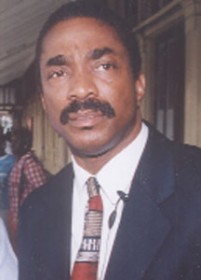
As it stood prior to the passage of the amendments, all magistrates were coroners. Coroner’s inquests were heard by a magistrate presiding in or closest to the area where the unnatural death had occurred.
Williams told the National Assembly that what was before the House was “a simple amendment” as it seeks to amend one section of the Coroners Act.
He said that the amendment has it genesis in the years 2000 – 2007 which was described as the “years of the killing fields. A period in our history when we …ought to be ashamed of”. Williams said that during this period there were killing squads, prison escapees, black clothes squads and phantom squads.
Within three minutes into his presentation, he was asked by the Speaker whether he was talking on the Coroners (Amendment) Bill. He responded in the affirmative and continued adding that he was just “setting the scene to show why we came with the amendment”.
Williams said this was the period in which bodies “were strewn all around the country in a particular area. Bodies were turning up in trenches, isolated road, in people’s living rooms…they (relatives) need to have closure. They want to know how their brothers, their sons their fathers met their ends”.
He said during the period, which fell under the reign of the previous government those responsible for these deaths were never found or no cause attributed or no police cases made. “So the government of the day was either unwilling or they lacked the political will to investigate these unnatural deaths and so in our campaign …we promised the people, the families of these victims who were slain inexplicably that we would hold inquests and investigations and inquiries”.
He said that the amendment will increase and widen the category of persons who could perform the functions of coroner recognizing that the magistrates today are already burdened with cases before them. He said that it had been contended that the matter should go before a special select committee but he questioned the wisdom of doing this for just one section of the Act. “It is unthinkable”, adding that the amendments seeks to remedy a shortage of coroners.
PPP/C MP Adrian Anamayah told the House that he is ignorant of statements of a shortage of coroners as in Berbice there is a full complement of magistrate. He said that in this regards there is nothing preventing magistrates from conducting these inquests.
He questioned why government had embarked on a “piecemeal” amendment to the legislation adding that government copied almost wholesale from the Trinidad Coroners Act. “It is laziness. It speaks of incompetence. It does not address our concerns here in our jurisdiction. That is what is wrong with it. It is a copy and paste operation and we can do much better”, he stressed.
Anamayah stated that in the House the qualifications of the persons to take up this position should be legislated. He cited the qualifications of coroners in England and Wales which essentially is a degree in a medical or legal field of study and a previous career as a lawyer or physician.
Holistic
He said that the opposition’s position is that there needs to be a holistic review of the act and it needs to go to a select committee “where all these matters can be thrashed out”. He opined that if “proper consultation” was done with the respective stakeholders, it would reveal that the main challenge is the availability of the civilian witnesses.
He spoke of the need for fixed timelines for the investigation to be completed and for the coroner to complete his task and the establishment of a coroner’s office outfitted with a special investigative team which is equipped with the resources to solve these crimes and provide answers.
His fellow MP and former Home Affairs Minister Clement Rohee charged that the bill was “politically inspired”, adding that the government was up to mischief in attempting to pass it.
Agreeing that the Act is a matter of national importance, he said that some of the amendments are not clear and he later called for clarity.
A fiery Minister of Public Security Khemraj Ramjattan said that the opposition while in government had an opportunity to fix the Act but nothing was done. “They are now coming here to lecture us as to the moral authority or the lack of that we have in relation to wanting to do as they describe it – piece meal…piece meal is better than nil meal”, he said.
He stressed that while the opposition was in government they made no attempt to do anything with the Disciplined Service Commission report and the recommendations of the select committee. “We said we were better and we are amending here”, he said adding that the amendments go a far way.
He dismissed Rohee previous assertions of political mischief. “If we were to ask about political mischief it might have been the lack of amending prior to today…If they didn’t like this law they could have amended that but they didn’t”, he said.
Insulated
According to Ramjattan it is the Judicial Service Commission that will appoint the coroners and not the Attorney General. “So we are not going to be political about it. The Judicial Service Commission is made up of who…the Chief Justice… the chancellor and whosoever else constitute that very important body and they are insulated from any political mischief in my opinion”, he said.
Amidst loud heckling from the opposition benches, he could be heard shouting to them.
He later questioned what is wrong with “cut and paste if it is going to meet the requirements that we the executive see fit”.
Meanwhile, former Attorney General Anil Nandlall hammered the lack of consultations on the amendments before the House. “We on this side reject that because we consider it a degutting of our Parliament”.
Nandlall said that engagements should not occur at the Arthur Chung Convention Centre or the AG’s office but in the House. He called the government’s actions an “attempt to undermine parliamentary democracy”.
According to Nandlall, in its current form the coroners bill does not address the real issues that it ought to address. He said that the opposition’s position is that it would like the implementation of the Disciplined Forces Commission Report which requests that a holistic review be done. “That commission’s report should not be wasted”, he said adding that “we are basing our request for overhaul based on that recommendation and that recommendation came as a result of a review of the entire substantive act”.
Nandlall too argued that amendments were nonsensical, problematic and not worthy of the opposition’s support. He called for full-time coroners and not magistrates having two sets of duties.



